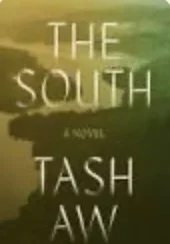The South by Tash Aw (Farrar, Straus & Giroux) ~Janet Brown
Just when it seems as if the coming-of-age novel is threadbare and ready for a decent burial, Tash Aw brings it back to new life in The South. Placing this at the southern edge of Malaysia at the time of the Asian financial meltdown of 1997, when even Singapore teetered on the edge of disaster, Aw puts his young protagonist’s growing pains squarely against the challenges brought to the world by globalization and climate change, making potential cliches turn fresh and poignant in this juxtaposition.
When Jay’s mother inherits a farm from her father-in-law, she packs up her entire family and takes them to a part of Malaysia that her urban children have never known. Her husband, a taciturn and stern academic, isn’t enchanted by this odyssey. He’s never understood why his father bought this piece of land that becomes less productive every year. Although he grew up with the farm’s manager, he has never established a true friendship with Fong and is uncomfortable with his wife’s inheritance.
Jay, however, is immediately drawn to Fong’s son, Chuan, a boy several years his senior who is doing his best to construct a future that doesn’t include his father’s rural existence. He’s an attractive rebel and Jay, who has realized years ago that he is sexually drawn to his own gender, spends as much time with Chuan as he can.
Jay’s two sisters, on the threshold of adulthood, have chosen their separate strongholds. Lina has cut her hair painfully short, smokes cigarettes, sports a tattoo, and disdains any thought of romance. Yin has patterned herself after her mother, whom she resembles and has fallen in love. Unfortunately the man she has chosen is Malay and Muslim which guarantees the opposition of her Malaysian-Chinese parents, should they ever learn about this relationship.
With the parents preoccupied with what seems to be a failing marriage and with the problems of owning a failing farm, each member of the family carves out their own personal territory. Nobody notices the intimacy that is burgeoning between Jay and Chuan, with Jay taking on the status of a quasi-adult both on the farm and in the neighboring towns. He’s developing an attachment to the land that he thinks may become his home, along with a detached passion for Chuan. Although they’re physically close, Jay is aware that their future lives will diverge and he brings that lens to this love affair, savoring it while knowing it will be only his introduction to a life of intimacy with men.
Aw brings a lyrical sensibility to a vanishing way of life when he describes the farm. As Jay learns to love this harsh and deteriorating landscape, so do the readers. When it’s betrayed by its new owner, this is a tragedy that’s painful, an aching loss that’s as haunting as the expulsion at the end of Genesis.
Aw prefigures his conclusion with a number of clues: the holiday chalets built on land that had once been part of the farm but which remain unfinished when the Southeast Asian economies collapse, the Burmese woman in a rural Malaysian market who speaks Cantonese and sells smuggled goods that are made in Thailand and embossed with the logos of multinational brands, a recent rush on the banks that drained ATMs across the country, the demonization of the IMF and George Soros.
Chuan reveals his ambitions, “to get a big TV and a karaoke set and a huge stereo,” disregarding his father’s struggle to keep the farm alive, even though its greatest value lies in its proximity to Singapore.
“You can’t call it an orchard if it no longer bears fruit--we agreed on that.” “When a piece of land that was once a farm is no longer a farm,” what is it going to become?
“It’s called El NIno,” Jay tells Chuan, describing the drought that is killing the land as “a cyclical weather system.” But who has the patience to wait out a cycle when there’s money to be made? How can a boyhood love affair prevail when one of them is slated for a university education while the other had failed all his subjects and left school at seventeen? It’s a tribute to Aw’s artistry that he brings grief to these endings by linking them to a loss of innocence that, without warning, will soon strike the entire world.
